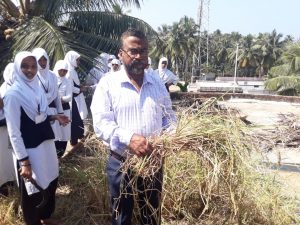Using discarded refrigerators as pots, a group of high-school children of Ullal in Mangalore now grow organic farm produce to meet their daily vegetable requirements. Once lying discarded on the streets, the ‘thermally insulated’ compartments of unused refrigerators act as eco-friendly pots for growing a variety of vegetables on the ‘rooftop garden’ of Sayyed Madani Urdu Higher Primary School (SMUHGPS), located in Halekote within the Ullal City Municipality. Over the last two years, the students of this co-educational school, along with the management, have sown and tended to almost 10 varieties of vegetation and have successfully harvested paddy for consumption.
Visit SMUHGPS and you will see close to 30 such thermally insulated compartments of discarded refrigerators, neatly lined on the ground. At the very first glance, one can see plantains, eggplant, spinach, cucumber, beans and paddy among the crops ready to be harvested. “From tilling of the soil, applying organic manure to gathering the crops, it is the students who are in charge of everything; our teachers are merely guiding them through the process,” said the Headmaster of SMUHGPS, K M K Manjanady.
This team of young urban farmers, mostly comprised of students from 6th standard to 10th standard of the school, got the idea as they came upon several discarded refrigerators lying around in the neighbourhood of the school. “Given the residential, fishing units and cold storage units in the area, the local panchayats including Ullal Panchayat in Mangaluru had been complaining for several years about the random disposal of refrigerator compartments. But not many were keen on re-selling or reusing or recycling, so most of these ended up at the Pachanady landfill. “The dimensions of these compartments gave us the idea and we acted on putting the old refrigerators to good use,” Manjanady said.

Headmaster of the school KMK Manjanady explains how the children are growing their own food. Pic: StoryInfinity
Chemical-free and tended using self-brewed organic compost, all the produce is used to prepare mid-day meals for the students. “Of course, given that the number of students is 400, it might not be possible for the school to provide vegetables for all. But a good amount of the farm produce is mixed with vegetables bought from the market and served at mid-day meals,” said Vijay Kumar Uliya, a farmer partnering the school for the project said.
According to Vijay, each compartment is almost 2 feet deep and about 4 feet in length. “It gives us the scope to cultivate almost any kind of crop that is locally consumed. The exercise has not only enabled children to appreciate farmers, farming and the art of growing their own food but also made them aware about how, with a little bit of creativity, any discarded material can be used to the benefit of the environment,” he said.
Initially, the school just used the freely available, discarded units, but eventually they turned to scrap dealers to procure more of these and expand their agricultural production capacity. “At first even the scrap dealers were clueless as to why we wanted the discarded refrigerator compartments. They offered to give us a couple of them for free. But when we told them about our requirement for more of these, they charged us Rs 75 to Rs 200 per refrigerator,” Vijay shared.
The school authorities say that the paddy cultivated has fetched them good yield. To contain water leakage from the terrace they have insulated the spot with metal sheets. In appreciation of their effort, the local administration has offered financial assistance to the school to procure farming allied material for school farming.
“Children are closely connected to the entire process. Their perspective towards farming has changed a lot and they have developed an emotional connection with the harvest. Involvement at an early age will hopefully inspire a few of these children to contribute to farming as they grow, bring in new ideas and promote agricultural activities even within the growing urban landscape,” said the school authorities.
Very interesting story, Harsha. Sometimes we’re insulated from the good work done by inspired young people – like the students of this school. It’s very useful to share their accomplishments with the wider world. And Citizen Matters is a wonderful place to do that.
Wow! So innovative and useful! All the schools to take a cue from this example and introduce children to such positive activities.
Why not implement this idea in other schools also….
Compliments to the School Children who initiated this idea. They deserve appreciation and the idea is worth emulating. This is a good beginning by the children who will face greater challenges in the days to come and I am happy they have indicated their preparedness through this effort.